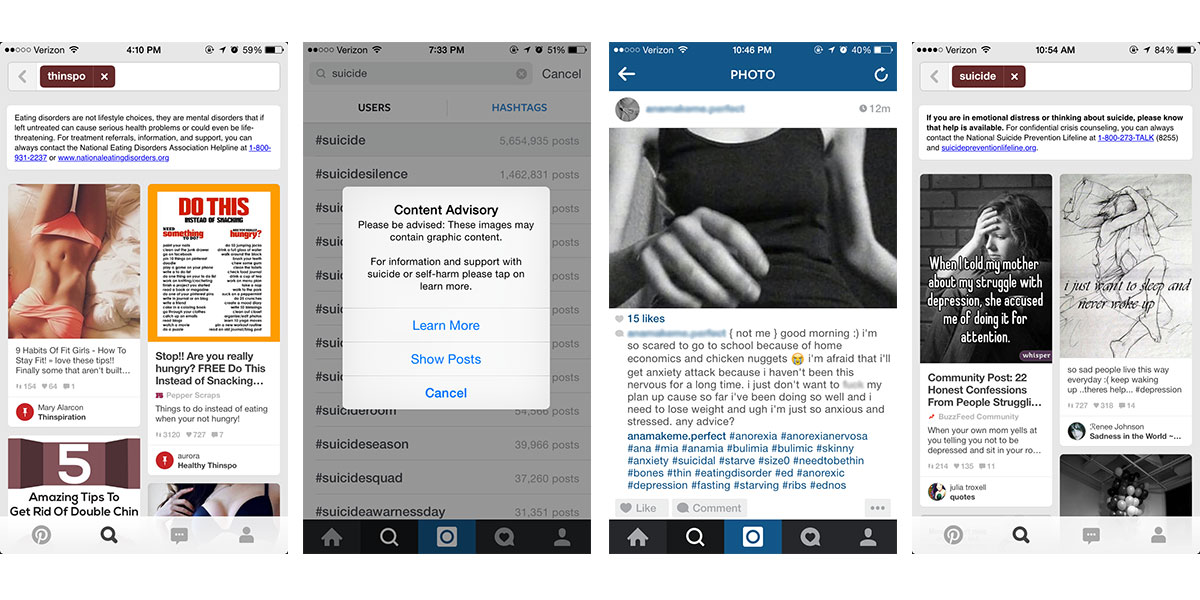As social media grows as our main source of connection, some sites are recognizing the danger in being too connected.
__________________________________________________
Social media has become a fighting force for this generation.
Everything from online petitions about anti-bullying and dropping police charges to relevant news stories can be found with the touch of a button.
However, there is a much darker side to social media.
There are many hashtags and online accounts dedicated to promoting things like self-harm, eating disorders and even suicide.
In response, many social media sites are doing their share to warn of the destructive patterns that following or posting these trending topics can prompt.
In 2012, Instagram banned hashtags like, “thinspo,” “proanorexia,” “probulimia” and “loseweight.”
Their hope was that by banning these, they would discourage users from living that lifestyle.
By posting pictures of protruding collarbones and scary thigh gaps, users could be affirmed by the likes and comments they received by others in the same circumstances by forming communities to support each other.
“I think we should be very wary of having ‘a community of like-minded people’ in these particular struggles. A long-standing problem with ‘group therapy’ is the temptation to validate each other’s harmful behaviors and create a bond that reinforces destructive behaviors, rather than challenging one another to break out of the bondage that they are in,” Dr. Holly Brand, an associate professor of psychology at MBU, said in an email.
Instagram released a statement in April 2012 along with its ban of #thinspo and #thinspiration saying, “Don’t promote or glorify self-harm. While Instagram is a place where people can share their lives with others through photographs, any account found encouraging or urging users to embrace anorexia, bulimia, or other eating disorders; or to cut, harm themselves, or commit suicide will result in a disabled account without warning.”
The statement goes on to say: “We believe that communication regarding these behaviors in order to create awareness, come together for support and to facilitate recovery is important, but that Instagram is not the place for active promotion or glorification of self-harm.”
In addition to eating disorders, Instagram has also created a content advisory that pops up anytime the keywords “suicide” or “self-harm” are typed in.
First, the notice warns of graphic content and then gives users the option to learn more about help they can receive.
You can then choose to learn more, continue on to the pictures or cancel and go back.
Instagram isn’t the only site to take a stand against these forms of self-hate.
Pinterest has also started showing public service announcements when certain words are searched.
When “suicide” is typed in, Pinterest delivers the following message: “If you are in emotional distress or thinking about suicide, please know that help is available. For confidential crisis counseling, you can always contact the National Suicide Prevention Lifeline at 1-800-273-TALK (8255) and suicidepreventionlifeline.org.”
A similar message appears after typing in “eating disorders.” It says: “Eating disorders are not lifestyle choices, they are mental disorders that if left untreated can cause serious health problems or could even be life-threatening. For treatment referrals, information, and support, you can always contact the National Eating Disorders Association Helpline at 1-800-931-2237 or www.nationaleatingdisorders.org.”
Tumblr and Twitter are also on board with banning certain keywords.
The question that remains for many is, will banning these hashtags really make a difference?
Huffingtonpost.com suggests that the No. 1 step in combating pro-anorexia and suicide accounts is to “stop giving a crap about ‘likes’ as a first step.”
However, Dr. Brand said, “I think that ‘banning’ hashtags that allow people to connect negatively is worthy in theory, but it is impossible to try to regulate something that is a matter of personal self-control. We see this all the time with government regulations — the more regulation you have, the less freedom you have.”
Even though social media is taking a step in the right direction, users will always find a way around the rules.
The hashtags “ana” and “mia,” slang for “anorexia” and “bulimia,” both have an average of 8 million posts on Instagram.
It is worth noting that some of those posts are users speaking out against eating disorders or updating other users of their recovery progress.
“The media feeds into this [lack of identity] by promoting the idea, especially to young women, that their value is derived from their appearance and sexuality,” Brand said. “I think social media feeds right into this beast, but as I just mentioned, I do not think it is the root of the problem.”
As a reminder, depression and eating disorders are in fact mental disorders that if left untreated can lead to more serious issues.
If you or someone you know are struggling with either of these, please contact the National Suicide Prevention Lifeline or the National Eating Disorders Association.
“I have been studying human behavior/adolescent psychology for 20 years and I am firmly convinced, based on all available data, that the root cause of these issues, along with every struggle known to man, is lack of identity,” Dr. Brand said. “As a Christian I know that true identity, value and worth come from the fact that Jesus paid an inordinate price for me — His life.”
